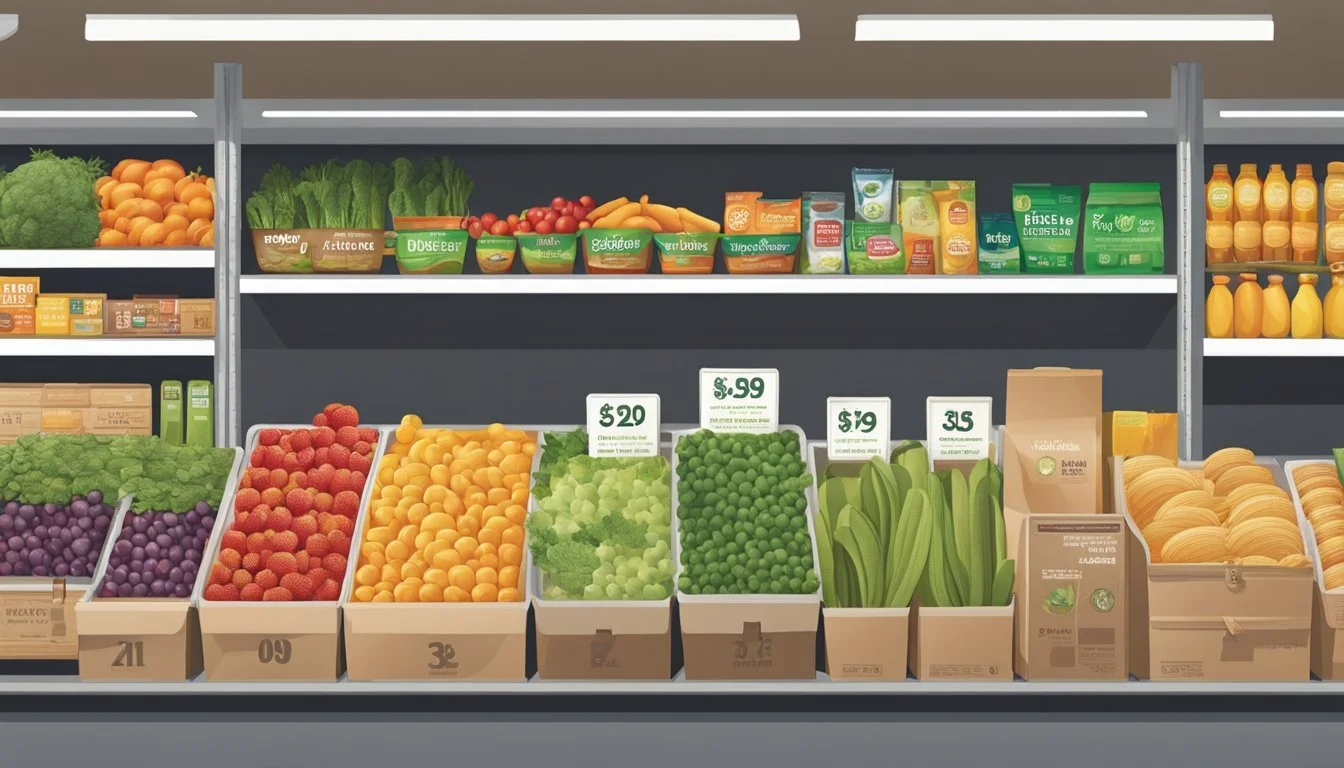Whole Foods Market vs. Winn-Dixie
Comparing Shopping Experience and Quality
Part of Our Grocery Store Guide with Details on Whole Foods Market Prices and Winn-Dixie Prices
Evaluating grocery stores often comes down to a balance between quality and affordability. Whole Foods Market and Winn-Dixie represent two ends of the spectrum in the American grocery landscape. Whole Foods Market, highly regarded for its quality, emphasizes healthy, organic products and sustainable practices. It stands out for its commitment to stringent animal welfare standards, ensuring that the meats sold in its stores come from animals treated humanely and without unnecessary antibiotics.
Winn-Dixie, on the other hand, is a well-known southern grocer with a focus on affordability. Through its line called SE Grocers, it offers products that are typically 20% cheaper than national brands while aiming to maintain a competitive taste and quality. The chain is known for providing good value for everyday items such as white sandwich bread and raw chicken, which appeals to budget-conscious shoppers.
When comparing Whole Foods and Winn-Dixie, customers make choices based on their individual needs and priorities. Whole Foods attracts those willing to pay a premium for specialty items and higher welfare products. Conversely, Winn-Dixie caters to those looking for cost-effective options without a significant compromise on quality. Both grocery stores serve distinct market segments and offer unique advantages to their clientele.
Comparing Store Philosophies
The philosophies of Whole Foods Market and Winn-Dixie represent a contrast in supermarket cultures, focusing on organic quality and affordability, respectively. Each influences how they serve their customers and position their store brands.
Whole Foods Market's Ethos
Whole Foods Market places a strong emphasis on eco-consciousness and the wellness lifestyle. They prioritize organic and natural products, aiming to provide a high-quality shopping experience. Whole Foods' private-label brand, 365 Everyday Value, is reflective of their commitment to affordability within the organic sector, offering customers a wide range of organic options at a reduced cost compared to name brands.
Winn-Dixie's Market Position
In contrast, Winn-Dixie focuses on providing economic value while still maintaining quality. Their store brand, SE Grocers, offers a similar taste and quality to national brands but is usually more budget-friendly, often around 20% cheaper. Winn-Dixie aims to deliver value through everyday items like white sandwich bread and raw chicken, solidifying their position as a go-to supermarket for essentials.
Product Assortment and Quality
When determining which grocery store is better, a key comparison point lies in the diversity and quality of their product offerings, especially considering organic and fresh produce, meat quality and variety, as well as dairy and specialty items.
Organic and Fresh Produce
Whole Foods Market positions itself as a leader in organic and fresh produce, catering to health-conscious consumers by offering a vast selection of organic fruits and vegetables. Their commitment to quality is evident in their stringent sourcing policies, ensuring that produce meets high standards of freshness and organic integrity. Winn-Dixie, on the other hand, also provides a range of conventional and some organic produce, yet traditionally at a more affordable price point.
Meat Quality and Variety
Whole Foods Market is known for its high-quality meat, including beef, pork, chicken, and turkey. They pride themselves on animal welfare standards and offer options like grass-fed and meats with no added hormones. Shoppers at Winn-Dixie have access to a decent selection of meats that often come with cost savings. While the quality is generally seen as good, they may not match the premium options, such as aged or grass-fed varieties found at Whole Foods Market.
Dairy and Specialty Items
Whole Foods Market boasts a premium assortment of dairy products, including artisan cheeses and a variety of specialty items that are often organic or locally sourced. Winn-Dixie offers a standard selection of dairy goods, including national brand equivalents under their SE Grocers label. While you may find premium options, the emphasis is on value rather than diversity or exclusivity of products.
Pricing and Value
When comparing Whole Foods Market and Winn-Dixie, the discussion of pricing and value takes into account everyday prices, private label brands, and membership programs. These factors are crucial in determining which grocery store offers better deals.
Everyday Prices and Sales
Whole Foods Market, known for its organic and high-quality selections, generally has higher everyday prices compared to Winn-Dixie. However, Whole Foods does offer weekly sales and discounts on various items. Winn-Dixie is competitive with its everyday pricing and frequently promotes sales and discounts, which can rival the prices of discount stores such as Aldi and Walmart.
Whole Foods Market: Regularly higher priced with occasional discounts.
Winn-Dixie: More affordable everyday pricing with frequent sales.
Private Labels and Exclusives
Both stores have their private labels which often provide savings compared to national brands. Whole Foods has its 365 Everyday Value line, renowned for its quality and competitive pricing. Winn-Dixie offers its SE Grocers products, which are reportedly 20% cheaper than national brands, providing a strong value proposition.
365 Everyday Value: High quality, lower prices than national brands.
SE Grocers: Comparable taste and quality, with significant savings.
Membership and Loyalty Programs
Whole Foods Market benefits from its affiliation with Amazon Prime, where members receive exclusive savings and free delivery options. This elevates the value of shopping at Whole Foods for Prime members. Winn-Dixie, on the other hand, has a loyalty program that offers fuel perks and direct discounts at the register, leading to immediate savings.
Amazon Prime: Additional savings and perks for Whole Foods shoppers.
Winn-Dixie Loyalty Program: Instant discounts and additional benefits on purchases.
Customer Experience
When comparing Whole Foods Market and Winn-Dixie, customers can anticipate distinctive store environments and customer service experiences shaped by each retailer's unique brand and marketing strategies.
Store Ambiance and Layout
Whole Foods Market offers an upscale shopping atmosphere, known for its aesthetically pleasing design and well-organized layout. The stores often feature abundant natural lighting and an extensive selection of organic and natural foods prominently displayed. Winn-Dixie takes a more traditional approach, focusing on a straightforward, cost-effective shopping experience. The layout is functional and designed to facilitate easy navigation, with the store brand SE Grocers frequently highlighted for its value.
Customer Service and Checkout Efficiency
Customer service at Whole Foods Market tends to emphasize extensive knowledge about products, including health and dietary information, which aligns with the store's organic and health-conscious branding. They also invest heavily in customer experience, making the checkout process as streamlined as possible, often incorporating technology for speed and convenience.
Conversely, Winn-Dixie aims to provide efficient service, with a focus on value and friendliness. Checkout efficiency is a key aspect of their service, with a less tech-heavy approach when compared to Whole Foods but maintaining effectiveness through traditional customer service logistics.
Locations and Accessibility
When considering accessibility between Whole Foods Market and Winn-Dixie, customers often weigh store proximity and the convenience of online shopping services. Each brand offers a distinct footprint and service options that cater to their target demographics.
Store Proximity and Convenience
Whole Foods Market, as a subsidiary of Amazon, has a ubiquitous presence with locations primarily in urban and upscale suburban areas. This positioning reflects its focus on organic and healthy food options, which tends to attract a specific market segment. Whole Foods stores are often found in densely populated regions, making them highly accessible for city dwellers.
Number of Whole Foods Stores: Approximately 500
Regional Concentration: Throughout the US, with a higher density in metropolitan areas
On the other hand, Winn-Dixie operates mainly in the southern United States. Its stores serve a regional customer base, and the supermarket is known for competitive pricing on everyday items.
Number of Winn-Dixie Stores: Over 500
Regional Presence: Concentrated in the Southeastern US, including Florida, Alabama, Louisiana, Georgia, and Mississippi
Online Shopping and Delivery Services
Amazon's acquisition of Whole Foods Market has significantly expanded online shopping and delivery options for customers. Whole Foods benefits from Amazon's robust delivery network, providing a seamless online grocery shopping experience. This service includes features such as:
Amazon Prime Now: Offers two-hour delivery on thousands of items
Amazon Fresh: Delivers a wide assortment of groceries, including Whole Foods products
Winn-Dixie, while not backed by an e-commerce giant, offers its customers the convenience of online shopping, complete with delivery and curbside pickup services in select locations. They partner with third-party services to ensure their customers have access to online grocery shopping.
Delivery Partnerships: Collaborations with services like Instacart
Online Shopping Features: An increasing number of stores are offering online service options
Brand Reputation and Marketing
This section closely examines how Whole Foods Market and Winn-Dixie handle their brand reputation and marketing in a competitive industry, taking into account their advertising strategies, customer perception based on surveys, and how they adapt to market trends and competition.
Advertising Strategies
Whole Foods Market positions itself as a premium grocer, focusing its marketing on organic and high-quality produce. Their advertising often underscores the brand’s commitment to natural and environmentally friendly products. Comparatively, Winn-Dixie advertises more traditional sales and discounts with less focus on the organic market. Both brands engage in periodic marketing campaigns, but Whole Foods typically allocates a significant part of its budget towards educating its customers on the benefits of organic food.
Customer Perception and Surveys
Based on customer surveys, Whole Foods has a reputation for high quality and excellent customer service, contributing to a positive brand perception. However, this comes with the perception of higher prices. According to a survey that included other stores such as Trader Joe's and Sprouts, Whole Foods often ranks high for customer satisfaction. On the other hand, Winn-Dixie is perceived more as a value-oriented store, which reflects a different customer priority. They may score lower in surveys that prioritize organic options but compete well in surveys focusing on value for money.
Market Trends and Competition
Whole Foods Market is recognized for setting trends within the supermarket industry, especially in the organic and health-conscious segments. With competitors like Trader Joe’s, Sprouts, and Kroger expanding their organic offerings, Whole Foods continues to innovate to stay ahead. In contrast, Winn-Dixie competes by offering competitive pricing and a focus on conventional grocery items, appealing to a broader market segment not solely looking for organic products. Their strategies reflect dynamic approaches to staying relevant amidst shifting market trends and consumer expectations.
Health and Dietary Focus
When comparing Whole Foods Market and Winn-Dixie, the health and dietary focus of each store is evident through their range of specialty products and dedicated marketing efforts. Each store caters to various health-conscious consumers and those with specific dietary needs.
Special Dietary Products
Whole Foods Market:
Organic Products: A broad selection of certified organic fruits, vegetables, and packaged goods.
Vegan Options: Offers an extensive array of vegan substitutes, including dairy-free cheeses and plant-based meats.
Gluten-Free Products: Well-marked sections featuring gluten-free bread, snacks, and baking ingredients.
Winn-Dixie:
Organic Selection: Carries a range of organic options, though less extensive than Whole Foods.
Vegan Products: Stocks several vegan-friendly items, but with more limited variety.
Gluten-Free Items: Provides gluten-free choices, with an emphasis on affordability.
Health-Conscious Marketing
Whole Foods Market:
Branding: Strongly emphasizes its commitment to natural and organic food, aligning with the health-conscious consumer.
Education: Provides customers with information on health benefits and dietary information for its products.
Winn-Dixie:
Promotion: Markets its organic and health-focused products as cost-effective alternatives.
Awareness: Raises awareness of its health-oriented brands and special diet offerings through in-store signage and flyers.
Sustainability and Corporate Responsibility
Whole Foods Market and Winn-Dixie both engage in practices aimed at sustainability and corporate responsibility. The impact on the environment, product sourcing, and involvement within the community are core elements of their strategies.
Environmental Initiatives
Whole Foods Market has taken significant steps in reducing its carbon footprint and combating food waste. They focus on consciously sourcing products and have implemented programs to ensure the organic and local nature of their offerings. The company maintains standards for animal welfare and is known for its dedication to organic products.
Carbon Footprint Reduction: Emphasizes renewable energy use and energy-efficient stores.
Food Waste Management: Implements practices to minimize waste throughout the supply chain.
Winn-Dixie and its parent company Southeastern Grocers have also released reports outlining their dedication to environmental sustainability. These reports suggest a commitment to:
Sustainable Sourcing: Regional and national initiatives to support local producers.
Resource Conservation: Efforts to reduce the environmental impact through efficient operational practices.
Community Involvement
Whole Foods Market believes in nourishing and giving back to the communities where they operate. They support various local programs and place a high value on community engagement.
Partnerships with local food banks and donation programs.
Support for local agriculture and food producers.
On the other hand, Winn-Dixie engages in community support through:
Corporate Social Responsibility (CSR) initiatives that address local community needs.
Programs designed to involve stores and employees in charitable activities.
Both brands strive to balance business growth with ecological conservation and social responsibility, adhering to values that resonate with environmentally conscious consumers.
Conclusion
Whole Foods Market and Winn-Dixie cater to distinct customer bases with different priorities. Whole Foods is synonymous with high standards in quality, particularly in meat products where over 100 animal welfare standards are in place before products reach the shelves. Their commitment ensures that antibiotics-treated animals are not sold, reflecting a dedication to natural food sourcing.
On the other hand, Winn-Dixie appeals to budget-conscious shoppers by offering competitive pricing, often deemed 20% cheaper than national brands for everyday items. Their SE Grocers brand aims to match the taste and quality of national brands, creating good value for money.
Here is a concise comparison:
Aspect Whole Foods Winn-Dixie Quality Higher standards Comparable to national brands Pricing Premium Cost-effective Product Sourcing Strict welfare standards Focus on value Ideal Customer Health-conscious consumers Budget-conscious shoppers
In determining which grocery store is better, one must assess personal needs and preferences. Whole Foods leads for those seeking organic and high-quality options, while Winn-Dixie is a practical choice for shoppers prioritizing their budget without compromising on taste. Both stores provide valuable shopping experiences tailored to their specific customer groups.










